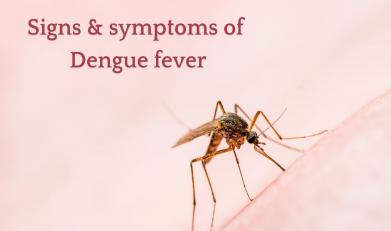

25 Jul, 2024
Dengue fever, often simply referred to as dengue, is a mosquito-borne viral infection that affects millions of people worldwide. With its increasing prevalence, understanding dengue's symptoms, prevention strategies, and treatment options is crucial for public health.
Dengue fever is caused by the dengue virus, which is transmitted to humans through the bite of an infected Aedes mosquito, primarily Aedes aegypti. This mosquito species is most active during the early morning and late afternoon. The virus exists in four distinct serotypes (DENV-1, DENV-2, DENV-3, and DENV-4), meaning that a person can be infected with dengue up to four times in their lifetime.
Symptoms typically appear 4-10 days after being bitten by an infected mosquito and can last for 2-7 days. They include:
High fever (up to 104°F or 40°C)
Severe headache
Pain behind the eyes
Joint and muscle pain
Nausea and vomiting
Fatigue
Skin rash (which can appear 2-5 days after the onset of fever)
Mild bleeding (such as nose or gum bleeding, or easy bruising)
In severe cases, dengue can develop into dengue hemorrhagic fever (DHF) or dengue shock syndrome (DSS), which can be life-threatening. These severe forms are characterized by severe abdominal pain, persistent vomiting, rapid breathing, bleeding gums, fatigue, restlessness, and blood in vomit.
Preventing dengue primarily involves reducing mosquito exposure. Here are some effective strategies:
Use mosquito repellents on skin and clothing.
Wear long-sleeved shirts, long pants, socks, and shoes.
Use mosquito nets while sleeping, even during the day.
Ensure window and door screens are intact to prevent mosquitoes from entering indoors.
Remove standing water from containers, such as flower pots, buckets, and discarded tires, where mosquitoes breed.
Regularly change water in pet bowls, birdbaths, and vases.
Keep gutters clean and free of debris.
Participate in community clean-up campaigns to reduce mosquito breeding sites.
Support local government initiatives to control mosquito populations.
There is no specific antiviral treatment for dengue fever. Management focuses on relieving symptoms and maintaining hydration. Here are some key aspects:
Drink plenty of fluids like water, oral rehydration solutions, or natural fruit juices to prevent dehydration.
Get ample rest to help the body fight off the infection.
Use acetaminophen (paracetamol) for fever and pain relief.
Avoid aspirin, ibuprofen, and other non-steroidal anti-inflammatory drugs (NSAIDs), as they can increase the risk of bleeding.
Seek immediate medical care if symptoms worsen or if there are signs of severe dengue, such as severe abdominal pain, persistent vomiting, or bleeding.
Dengue fever is a serious illness that requires awareness and proactive measures for prevention. By understanding the symptoms and following effective prevention strategies, we can reduce the risk of infection. In case of dengue symptoms, seeking prompt medical attention and supportive care is essential for recovery. Public health efforts and community participation are vital in controlling the spread of dengue and protecting vulnerable populations.